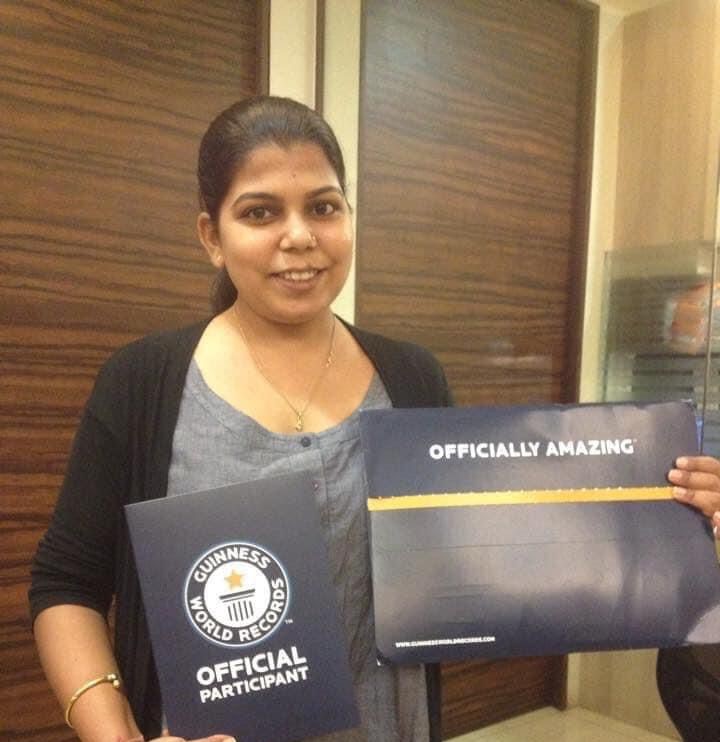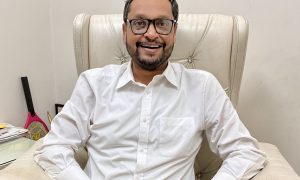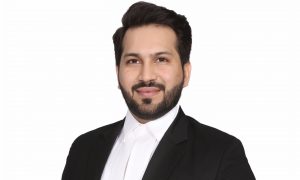This interview has been published by Namrata Singh and The SuperLawyer Team

Reflecting on your journey, what inspired you to pursue a career in law, and could you share some of the challenges you faced in the early stages of your career? How did you overcome them, and what lessons did you learn along the way?
It was soon after my ICSE Board exams, I believe in the year 2007, when I came across a newspaper article “JOIN INDIAN ARMY- JAG ENTRY SCHEME” I remember reading that article multiple times and checking the eligibility criteria being graduate in law with other requirements. At that moment I knew my calling was Law. I wanted to pursue Law to make my career in the Indian Army. One of the few challenges I faced early in my career was probably lack of guidance and mentorship. I believe my generation was still hesitant to ask questions to Professors or Seniors Advocates in the Law field. I also feel that back in 2007 we had very less practical exposure in the field of Law like we didn’t have field trips to Court back than or limited moot court competitions. However, I was able to overcome the obstacles and I started expressing these issues through my articles for a local newspaper. These articles helped me land internships and various other competitions that helped my overall growth in the early stages of my career.
Your journey showcases a remarkable blend of legal expertise and academic prowess. How do you balance your roles as a practicing lawyer, senior legal analyst, and a committed Ph.D. scholar?
“Time management is an oxymoron. Time is beyond our control, and the clock keeps ticking regardless of how we lead our lives. Priority management is the answer to maximizing the time we have” –John C Maxwell. Practicing Law is my passion ever since I entered Law School. However, being in Practice for more than 12 years now has brought me the opportunities to don many hats and be versatile in my work. Being a Senior Legal Analyst with Government of Andhra Pradesh gave me insights of seeing the difficulties that any Government Office faces during the entire litigation process and with my experience, expertise and knowledge, if I am able to assist and help in resolving an X number of cases, helping the Government is a once in lifetime opportunity. However, at the same time I always had the desire to increase my knowledge and keep my research in various field of law active, hence I decided to pursue Ph.D. I prioritise my time during the day to find balance in my work as well as my personal life. I do prepare my To-do list everyday in the morning trying to tick of all of them during the day thus achieving my roles as a scholar, analyst and an advocate.
As a Senior Legal Analyst at APCFSS Government of Andhra Pradesh, you’ve been instrumental in various projects. Could you shed light on a project that particularly resonated with you and why?
As a Senior Legal Analyst at APCFSS Government of Andhra Pradesh, I’ve been fortunate to contribute to two impactful projects. The first is the AP Online Legal Case Management System (APOLCMS), a web-based system designed for government departments and officers to manage and monitor court cases. APOLCMS significantly improves efficiency and transparency in the legal system.
The second project involved conducting capacity building workshops for Government Officers. In these workshops, I had the opportunity to explain the Basics of Law, including Writs, Contempt Petitions, and different types of Writ Petitions. I also helped them develop practical skills like preparing para-wise remarks for writ petitions and counter affidavits.
There are a couple of reasons why this project resonates with me:
- Improved Efficiency: Prior to APOLCMS, tracking cases and maintaining a complete history was a cumbersome and time-consuming process. APOL CMS allows departments to electronically manage cases, generate reports, and stay up-to-date on the latest developments – all of which significantly improves efficiency.
- Transparency and Accessibility: APOLCMS promotes greater transparency by providing easy access to case information. This can be helpful for various stakeholders involved in the legal process, including government departments, lawyers, and potentially even the public (depending on the specific case).
- Overall, I believe APOLCMS is a powerful tool that is making a positive impact on the Andhra Pradesh court system. It streamlines processes, improves transparency, and ultimately helps ensure that legal matters are handled more effectively.
Your transition from practicing advocate to assistant professor reflects a significant shift. Could you elaborate on what prompted this transition and how your experiences in legal practice inform your approach to teaching law students?
The transition from practicing advocate to Assistant professor was indeed a significant one, driven by a few key factors:
A Passion for Knowledge Sharing: While I enjoyed the challenge and advocacy of legal practice, I’ve always had a strong interest in sharing legal knowledge and helping others understand the intricacies of the law. Teaching allows me to delve deeper into legal concepts and ignite a passion for the law in the next generation of legal professionals.
A Broader Perspective: Legal practice often focuses on specific cases and client needs. As a professor, I have the opportunity to present a broader perspective on the law, exploring its historical context, theoretical underpinnings, and its evolution over time. This allows students to develop a more holistic understanding of the legal system.
Real-World Application: My experience in practice allows me to bring real-world case studies and practical scenarios into the classroom. This helps bridge the gap between theory and practice, giving students a better understanding of how legal concepts are applied in real-world situations.
Mentorship and Guidance: Beyond knowledge transfer, I value the opportunity to mentor and guide law students. Witnessing their growth and development as future lawyers is incredibly rewarding.
In short, the transition was motivated by a desire to share my knowledge, provide a broader perspective on the law, and contribute to the development of the next generation of legal professionals. My experiences in practice inform my teaching in several ways. I can use real-world examples to illustrate legal concepts, discuss the practical considerations lawyers face, and prepare students for the realities of legal practice.
You’re the founder of The Lawgical Network, a startup aimed at bridging gaps in legal education and professional networking. What inspired you to embark on this entrepreneurial journey, and could you elaborate on the idea behind it and how the venture is progressing?
The idea for The Lawgical Network actually stemmed from two separate observations I made about the legal field:
The Gap in Legal Education: Legal education often focuses heavily on theory and case law, but doesn’t always adequately equip students with the practical skills they need to succeed in the real world. This can leave recent graduates feeling unprepared for the day-to-day realities of legal practice.
Limited Networking Opportunities: Building a strong professional network is crucial for any lawyer, but early-career professionals often lack access to established practitioners or mentors. This can make it difficult to find job opportunities or build a successful legal career.
These observations fuelled my desire to create The Lawgical Network – a platform that would bridge these gaps.
Here’s how we’re working towards that goal:
Practical Skills Development: We offer workshops and online resources focused on practical skills like legal writing, negotiation, and client communication. This supplements the theoretical foundation students receive in law school and prepares them for the practicalities of legal practice.
Mentorship Programs: We connect aspiring lawyers with established professionals for mentorship opportunities. This allows mentees to gain valuable insights and guidance from experienced practitioners.
Networking Events: We organize online and in-person networking events (depending on location) that connect law students, recent graduates, and experienced professionals. This fosters collaboration and helps build a strong legal community.
The Lawgical Network is still a young venture, but we’ve seen positive progress. We have a growing network of members, and our workshops and resources are receiving positive feedback. We’re constantly working on expanding our offerings and building a robust platform that empowers legal professionals at all stages of their careers.
You’ve conducted workshops and lectures on topics ranging from drafting pleadings to medico-legal practices. How do you see the role of education and outreach in shaping the legal community? what kind of questions you come across from the students in these workshops.
Education and outreach play a fundamental role in shaping a well-rounded and informed legal community. Here’s how I see their impact:
- Bridging the Knowledge Gap: Legal practice is constantly evolving, and new areas of law emerge regularly. Educational programs and outreach initiatives help legal professionals stay up-to-date on the latest developments, best practices, and emerging legal issues like cyber law or data privacy. This ensures they can provide competent and relevant legal services to their clients.
- Promoting Specialization and Expertise: Workshops and targeted programs allow legal professionals to delve deeper into specific areas of law, fostering specialization and expertise. This benefits both lawyers and the public, as clients can seek out lawyers with specialized knowledge tailored to their needs.
- Enhancing Public Awareness: Outreach programs can educate the public about their legal rights and responsibilities. This empowers individuals to navigate legal issues with more confidence and seek legal help when necessary. It can also foster a better understanding of the legal system as a whole.
- Promoting Ethical Conduct: Educational programs can emphasize ethical considerations and professional responsibility within the legal community. This helps maintain high ethical standards and fosters public trust in the legal system.
Now, regarding the questions I encounter during workshops, they tend to fall into a few categories:
- Practical Application: Many questions seek to bridge the gap between theory and practice. For instance, after a workshop on drafting pleadings, students might ask about specific situations or challenges they might encounter in real-world legal documents.
- Clarity and Specificity: Sometimes, legal concepts can be complex. I often get questions seeking clarification on specific aspects of a topic or requesting more details about a particular legal procedure.
- Emerging Areas of Law: As new areas of law develop, like those related to technology, students are curious about their implications and how they might impact their future legal careers.
These questions highlight the value of interactive workshops and open discussions. They allow participants to gain a deeper understanding of the legal issues at hand and prepare them for the practical realities of the legal field.
With your expertise, what advice would you offer to aspiring lawyers looking to make a meaningful impact in their careers, particularly in navigating the evolving legal landscape?
As someone with experience in both legal practice and legal education, here’s some advice I’d offer to aspiring lawyers looking to make a meaningful impact in their careers, especially considering the evolving legal landscape:
Develop a Strong Foundation:
- Master the Fundamentals: A solid understanding of legal principles, critical thinking skills, and strong legal research abilities will serve you well throughout your career. Don’t underestimate the importance of a strong foundation in core legal subjects.
- Stay Up-to-Date: The legal field is constantly changing. Commit to lifelong learning and stay abreast of emerging areas of law, such as cyber law, data privacy, and artificial intelligence’s legal implications. Consider attending workshops, conferences, or pursuing online courses.
Embrace Practical Skills:
- Go Beyond Theory: Legal education equips you with the theory, but practical skills are crucial for success. Seek opportunities to develop skills like legal writing, negotiation, client communication, and case management. This can be done through internships, externships, or online resources from platforms like The Lawgical Network (shameless plug!).
- Technology as a Tool: Technology is transforming the legal profession. Learn how to leverage legal technology tools for research, document automation, and case management. This will improve your efficiency and make you a more valuable asset.
Find Your Niche:
- Identify Your Interests: The legal field is vast. Explore different areas of law to discover what interests you and aligns with your values. Don’t be afraid to specialize in a specific area as you gain experience.
- Focus on Impact: Consider the kind of impact you want to make. Do you want to advocate for social justice issues, work in environmental law, or represent individuals in a specific legal area? Align your career path with your passions for a more fulfilling experience.
Build Your Network:
- Connect with Others: Building strong professional relationships is key to career success. Attend industry events, join bar associations, and connect with mentors who can offer guidance and support. Platforms like The Lawgical Network can also be a helpful tool for networking.
- Give Back to the Community: Consider volunteering your legal skills to pro bono organizations or legal aid clinics. This not only helps those in need but also allows you to gain valuable experience and make a positive impact.
Remember, a meaningful legal career is not just about financial success. It’s about using your legal expertise to make a difference, whether it’s advocating for a cause you believe in, helping individuals navigate complex legal issues, or simply upholding the rule of law. By continuously learning, developing practical skills, and aligning your work with your values, you can make a lasting impact in the ever-evolving legal landscape
Your articles in Speaking Tree, including “Self Motivation for Achieving Excellence” praised by Kiran Bedi, reflect a profound understanding of motivational topics. What inspires you to write on such uplifting subjects, and could you share when you first began your journey as a writer?
Thank you for mentioning my articles on Speaking Tree! It’s truly rewarding to know that my work resonates with others, especially the praise from someone as respected as Kiran Bedi.
My foray into writing about motivational topics stems from two main inspirations:
- Personal Growth: I’ve always been fascinated by the power of self-motivation and its ability to propel us towards achieving our goals. Throughout my own life, I’ve encountered challenges and setbacks, and learned the importance of maintaining a positive mindset and fostering self-belief. Writing allows me to explore these themes and share the insights I’ve gained with others.
- Uplifting Others: Life can be demanding, and it’s easy to get discouraged. I believe that by sharing stories of resilience, perseverance, and the importance of self-motivation, I can help uplift and inspire others to navigate their own challenges and pursue their dreams.
My writing journey actually began quite unexpectedly at the age of 7, when I started contributing to Champak and Tinkle in the form of poems, limericks and drawing. It wasn’t a predefined path, but rather an organic evolution. Perhaps during a particularly reflective period in my college days, I started penning down my thoughts and observations on self-motivation and achieving excellence. As I delved deeper, I felt compelled to share these ideas with a wider audience.
Platforms like Speaking Tree provided a wonderful opportunity to connect with others who might benefit from these messages. The positive feedback I received further fuelled my passion for writing on motivational topics. It’s a privilege to know that my words can make a difference in someone’s life.
As a Senior Legal Analyst at APCFSS Government of Andhra Pradesh, you’re engaged in a multitude of responsibilities. Could you walk us through a typical day in your professional life and shed light on the variety of tasks that keep you occupied?
The beauty of my role as a Senior Legal Analyst at APCFSS is the variety it offers. There’s no such thing as a “typical” day, but here’s a glimpse into the different tasks that might fill my schedule:
Morning:
- Review Case Files: My day often starts with reviewing case files assigned to my department. This involves analyzing legal issues, researching relevant case law and statutes using online legal databases or APOLCMS (the Andhra Pradesh Online Legal Case Management System I helped develop!), and identifying any missing information or potential roadblocks.
- Prepare Legal Memoranda: Based on my case file review, I might draft legal memoranda for senior attorneys. These documents summarize the key facts, legal arguments, and potential courses of action for a particular case.
- Respond to Inquiries: I frequently receive inquiries from government departments or officers needing legal guidance on various matters. These inquiries could be related to contract review, regulatory compliance, or specific legal procedures. I provide them with clear and concise legal advice, ensuring it aligns with established legal principles and government policies.
Afternoon:
- Attend Meetings: Collaboration is key in our department. I might participate in internal meetings with colleagues to discuss complex legal issues, strategize case approaches, or brainstorm solutions for emerging legal challenges. Occasionally, there might be meetings with external parties, such as representatives from other government agencies, to discuss interdepartmental legal matters.
- Legal Research: In-depth legal research is a recurring part of my day. This could involve delving into specific statutes, judicial precedents, or legal scholarship to identify the most relevant legal authorities to support our department’s position in a case or provide a comprehensive response to an inquiry.
- Draft Legal Documents: Depending on the case at hand, I might draft legal documents like petitions, notices, or affidavits. This requires meticulous attention to detail and ensuring the documents adhere to legal formatting and court requirements.
Later Afternoon/Evening:
- Stay Up-to-Date: The legal landscape is constantly evolving. I dedicate some time each day to staying abreast of legal developments through legal publications, online resources, or attending webinars on emerging legal issues.
- Project Work: In addition to my daily tasks, I might be involved in ongoing projects. This could involve anything from developing legal training materials for government officers to working on revisions to departmental legal policies and procedures.
As you can see, my day is a blend of research, analysis, writing, collaboration, and staying informed. The variety of tasks keeps the work challenging and intellectually stimulating. The ultimate goal is to leverage my legal expertise to support the effective functioning of the government and ensure legal matters are handled efficiently and accurately.
Amidst your demanding professional life, you’ve managed to pursue diverse interests, including trekking and writing. Could you share with us what aspects of these activities bring you the most joy, and how do you unwind and rejuvenate yourself amidst your busy schedule?
You’re absolutely right, maintaining a healthy work-life balance is essential, especially in a demanding role like mine. Here’s how I unwind and find rejuvenation through my hobbies:
Trekking:
- Connecting with Nature: Stepping away from the urban environment and immersing myself in nature is incredibly restorative. Trekking allows me to appreciate the beauty of the outdoors, breathe fresh air, and clear my head.
- Challenge and Accomplishment: The physical challenge of a trek is a welcome change from mental exertion. Reaching a summit or conquering a tough trail brings a sense of accomplishment and boosts my confidence. Watching the first Sunrise at 18000 feet is an incredible sight which comes after gruelling climb of 5-6 hours and that is spectacular. The other thing is unfurling our national flag/tricolour gives you goosebumps and feeling of pride and joy which motivates me to be involved in these expeditions.
- Mindfulness and Mental Clarity: The repetitive rhythm of walking and the focus required to navigate a trail promote mindfulness. This allows me to disconnect from daily worries and achieve a state of mental clarity.
Writing:
- Creative Expression: Writing provides a creative outlet for my thoughts and emotions. It allows me to explore ideas in a different way and express myself creatively.
- Helping Others: The fact that my writing on motivation and self-improvement resonates with others and can potentially help them on their journeys is incredibly rewarding.
- Mental Stimulation: Writing keeps my mind sharp and engaged. It requires research, critical thinking, and clear communication, all of which are valuable skills that translate into my professional life as well.
Unwinding and Rejuvenation:
- Prioritization: The key to unwinding is prioritization. I schedule time for these activities in my calendar, treating them as important appointments. This ensures I carve out dedicated time for myself amidst my busy schedule.
- Finding Pockets of Time: Even short breaks can be refreshing. A short walk during lunch or a few minutes of meditation in the morning can help me refocus and recharge.
- Importance of Sleep: Getting enough quality sleep is crucial for both physical and mental well-being. I prioritize a good night’s sleep to ensure I have the energy and focus to tackle my demanding tasks.
By incorporating these activities and prioritizing well-being practices, I’m able to maintain a healthy balance between my professional life and personal passions. This allows me to approach my work with a renewed sense of focus and creativity, ultimately making me a more effective Senior Professional.
Get in touch with Geetika Jain-


























